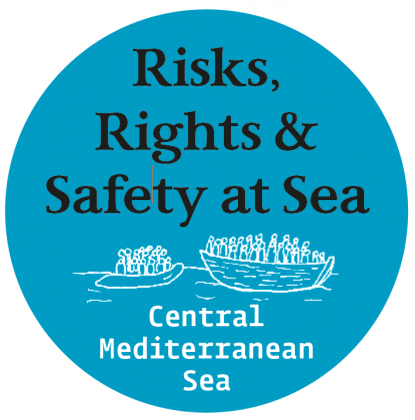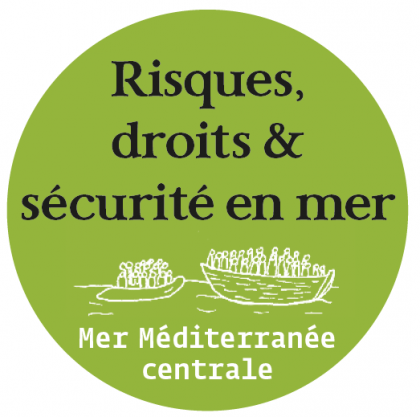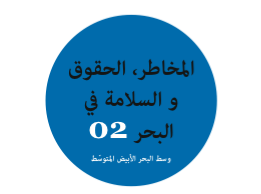This information is for people who are considering to cross the sea between Libya/Tunisia and Italy/Malta. Our intention is neither to deter people from attempting to cross, nor to encourage them, but rather to provide objective information and to share experiences about risks, rights, and vital safety measures to take at sea.
Emergency ContactsCoast Guards |
WHEN YOU DECIDE TO LEAVE, READ THIS:
Please check out the risks that you will be exposed to before making up your mind about crossing the sea. Hundreds of people die each year trying to cross the Central Mediterranean sea. In 2014, 3400 deaths were recorded, but real numbers are certainly higher.
Emergency Contacts
Legal entry into the EU territory for Tunisian and Libyan nationals as well as other non-Europen nationalities requires a visa, without which migrants are criminalised. Unauthorized departure may also be criminalized, as under the Tunisian law, offences of leaving the territory without any valid travel document/visa or leaving the territory from non designated official border areas are punishable by fines or prison sentences (Law of 03/02/2004, Article 35).
Many boats sink right after departure because they are in a poor condition. Some capsize because of overload, bad weather or panic on board. Others get lost or run out of fuel and drift away for days or weeks, with passengers on board slowly dying of hunger or thirst. Sometimes rescue services, despite having been called for help, fail in finding the boats because of a lack of clarity in communication. Often other boats at sea do not come to the rescue of migrants in distress even after spotting them. The following information will not make the crossing safe. You might also find yourself in situations in which you can‘t follow these suggestions. But this flyer does give you ideas about what to expect and how to prepare. When you organize in groups and prepare for the crossing, your influence on decisions can get bigger. This information might save your life.
Buy a life vest and supplies and take care of your important belongings
- Make sure that there are enough live vests on board for everybody! They cost TND 20 each; your life is worth it! Make sure that it is a life vest of good quality. Put them on as soon as your boat is leaving and wear them all the time.
- Take a well prepared, small backpack with you, fill it with a maximum of water and food (such as crackers, tinned food, dates and chocolate). Wrap it all up in waterproof plastic bags.
- Wear several layers of clothes fitted for the season, but do not forget to pack warm clothes and a waterproof jacket. Always wear a hat and sunglasses to avoid dehydration.
- You may also buy a medication against seasickness from the pharmacy (like Buscopan, which is available in Tunisia and Libya and not expensive)
- Wrap all your valuables in a plastic bag and have it on you. Consider that everything that is not on you risks getting lost if the boat capsizes. As your personal belongings might get lost or stolen, make copies or take photos of anything important such as documents that you might need as an evidence in your asylum case and send them by e-mail to your account and/or to a friend (if possible, in Europe). Write your name on your personal belongings and photos.
Check the navigation and communication equipment
- Make sure there are a GPS and a satellite phone in working condition, with fully charged batteries and spare ones as well. Make sure that somebody on board know how to use it, and how to figure out your location with the satellite phone (see below).
- Your mobile phone must be fully charged, and your balance high enough to allow several calls overseas (at least 30 TND). Your mobile phone will not work at high sea, but will off shore.
- Take along the Coastal Guards numbers.
- Take along numbers of relatives and acquaintances based in Tunisia, Libya, Italy and/or other countries, and let them know about your trip prior to departure, give them the numbers of rescue services and the alarm phone, so that they can call if they do not hear from you in due time.
Make sure that the emergency equipment on board works
• Take along several buckets of water or, for bigger boats, a pump in case there is an inlet of water.
• Make sure that there are emergency and warning signals on board! The navigation code imposes orange and red signals. For lack of better, anything likely to attract other people‘s attention can be useful; namely whistles, lightly colored clothes, plastic bags, mirrors, mobile phones or camera flashes, etc.
Check the weather forecast at departure & destination
• Check that the weather is good for the next three days at departure and destination points. Check on internet (WWW.METEOCONSULT.COM >> METEO CONSULT MARINE), or by downloading the METEO CONSULT MARINE application on your smartphone. Take time to make yourself familiar with it!
Do not get on board an overloaded or damaged boat
• Ask to see the boat before traveling! Try/test it!
• The hull of your boat must be in good condition: No holes, torn or deflated parts! If you carry it to the shore, beware of thorns: use a blanket to protect the rubber skin against them! Take a pump with you to inflate the boat. If the boat is in poor condition, your life is at immediate risk!
• Check for how many persons the boat you use is made. On average, a ten metres long boat cannot take more than 10 people on board. This number jumps to 30 people for a 20 metres long boat. An overloaded boat is exposed to sinking!
• We are well aware that relations with smugglers may make these security requirements impossible. But some people have refused to go onboard a boat in poor condition or/and overloaded, since this puts their life at immediate risk.
• Make sure there is enough fuel for the double length of the planned trip!
• Make sure that there are enough paddles, that they are in good condition, and that the people who hold the paddles have a good experience and are strong.
• Do not consume alcohol or any kind of drug!
AT SEA
Precautions during the trip
• Try to document everything that happens, including time and GPS coordinates of any event: take pictures/film events, or write, if possible. It can help you orientate your boat. Watch out around you for potential collisions!
• Always wear a hat, protect yourself from the cold, and try to keep your clothes as dry as possible.
• Do not eat too much, just enough not to be hungry. Drink little water, regularly. Don‘t ever drink sea water!
• In case of bad weather, hold on to ropes or any other fix parts of the boat.
• Do everything to keep the balance! Keep calm and don’t panic, no matter what happens! Avoid conflicts at any cost! Any abrupt reaction or any gesture of panic can put yourself at risk: people can fall off the boat, and the boat can capsize.
In case of danger, call for help
• If you are in immediate danger (for example if the sea is too rough, if you broke down or got lost, if someone fell off the boat), call all emergency numbers that you have immediately. Whatever your nationality or legal situation, rescuing people in distress at sea is an unconditional obligation for all captains of all boats around, as well as for coastal states.
• If you spot other boats or planes around, ask them for help with all means: through VHF•radio if you have one (make a >>mayday<< distress call and also specify your GPS location on channel 16), by launching a distress rocket, by waving clothes, by shouting, whistling, by flashing your mobile phones or any other electronic device. Do not light any fire in the boat to attract attention, the whole boat may burn down!
Emergency Contacts
Italy: + 39 065 908 4527 Malta: + 356 21 257267 Libya: + 218 21 4446799 or + 218 21 5630257 Tunisia (Ministry of Defence): + 216 71 560 240
• Try to find someone on board who can speak the language of the coast guards or English. Keep calm. Specify to them that: you are in distress, your GPS location, the number of people on board, the nationalities and health conditions of all the passengers, the number of men, women and children, as well as the size, the type and the condition of the boat (any water leaking? Is the engine running properly?). To have access to your position with a Thuraya satellite phone, proceed as follows: MENU > GPS MANAGER > CURRENT POSITION.
• If your batteries and credit allow it, get in touch with your relatives/acquaintances in Europe, Libya, Tunisia, or other countries.
• Contact the WatchTheMed Alarm Phone: + 334 86 51 71 61. This number is NOT A RESCUE NUMBER but an ALARM NUMBER to support rescue operations.
During rescue: Keep calm!
When being rescued by another boat, remain seated and do not make any sudden movement in the boat, this could make it capsize. If you wish to ask for asylum, say it clearly. The captain rescuing you must make sure that you have access to an asylum request procedure if you ask for it, and to take you to a harbour in a safe country where you will not be threatened.
Someone overboard or sinking
• If somebody falls into the water, stop the boat immediately. Do not lose sight of this person until she has been rescued! Throw a life buoy, life vest or any other floating object next to this person as soon as possible. Do what you can without risking your own live.
• A lonely person in the water with a life vest must float on her/his back. Several people in the water with life vests must tie themselves to each other to balance themselves, and heat each other up, or float on their backs all tied to each other if without life vests.
• When the person is back on board, take his/her clothes off, dry him/her and wrap him/her around in a blanket. If there is no sign of breathing, blow in his/her mouth and apply cardiac massage.
• If the entire boat has capsized, try to hang on to it, or to any floating parts. Try to create a lifesaver raft with empty water bottles or empty petrol cans!
ONCE ON THE MAINLAND
Asking for asylum
You have crossed a border without authorization, which is forbidden according to law. But the 1951 Geneva Convention says that you have the right to asylum when you are persecuted for your race, religion, nationality, membership of a particular social group or political opinion. You can also try to ask for asylum even when you don‘t belong to one of those categories. If this is what you want, you must tell the United Nations High Commissioner for Refugees (UNHCR) or the authorities (including the police if you cannot find any other representative) about it, and insist on your right to asylum. You can also ask to get in touch with relevant organisations to seek help and advice. Asylum seekers in Italy can use the following free number: 800 905 570 (ARCI). In Malta, you can contact Jesuit Refugee Service +356 21 41 26 06.
If you are a minor under 18 tell this immediately to the authorities when rescued and brought to Italy! For a detailed list of organisations in Europe and information about asylum procedures, visit the following web page: www.w2eu.info http://w2eu.info/pritings.en.html
Detention
Its possible that you will be put in detention. Entry into Italy without any valid visa can result in an 3 months deprivation of liberty. Releasing conditions are very strict, and if accused of having helped other people to enter the country illegally, a judicial procedure followed and/or preceded by several years of imprisonment can ensue. Besides, agreements between Tunisia and Italy allow quick deportation of migrants freshly arrived in Italy.
Report any death or violation of your rights
If people died on your boat, or if you were in distress and a boat failed in it‘s duty to rescue you while aware of your situation, you can get in touch with a local organisation defending migrants and demand that your testimony will be heard, or you can: write to info@watchmed.net
Watch the Mediterranean Sea (WTM – www.watchthemed.net) wishes to collect your testimony and condemn those facts so that they do not happen again. Try to give as much details as you can, and send any picture or video of the crossing. Your identity will not be revealed, and your testimony will be kept anonymous.
WatchTheMed Alarm Phone
+ 334 86 51 71 61
This number is NOT A RESCUE NUMBER but an ALARM NUMBER to support rescue operations. We created this number together with activists from different transnational networks who are in solidarity with migrants and refugees. We don’t have boats or helicopter to carry out rescue operations, so please make sure you FIRST CALL THE COAST GUARD. What we can do is follow up on their response, making known to them that we are informed and ‘watching’ them, If you are not promptly rescued or if you are being pushed back, we will INFORM THE MEDIA and protest against this.


